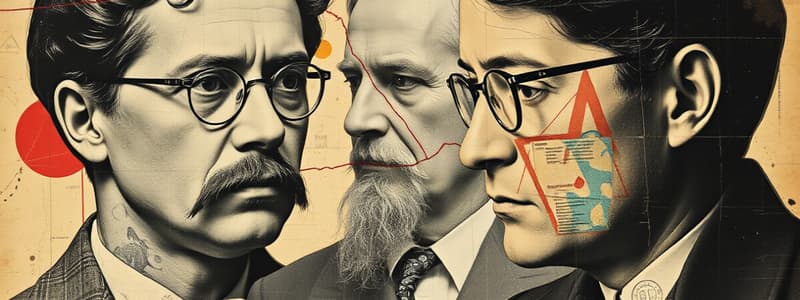Podcast
Questions and Answers
Who is known as the father of sociology?
Who is known as the father of sociology?
- Auguste Comte (correct)
- Charles Horton Cooley
- C.Wright Mills
- Emile Durkheim
What concept did C.Wright Mills introduce?
What concept did C.Wright Mills introduce?
Social imagination.
What term did Charles Horton Cooley use to explain self-perception?
What term did Charles Horton Cooley use to explain self-perception?
Looking-glass self.
What theory did Emile Durkheim believe in?
What theory did Emile Durkheim believe in?
What is Erving Goffman known for?
What is Erving Goffman known for?
What did George Herbert Mead contribute to sociology?
What did George Herbert Mead contribute to sociology?
What does Karl Marx's 'Communist Manifesto' argue?
What does Karl Marx's 'Communist Manifesto' argue?
What distinction did Robert Merton make?
What distinction did Robert Merton make?
What does Harold Garfinkel's ethnomethodology study?
What does Harold Garfinkel's ethnomethodology study?
What did Amitai Etzioni differentiate?
What did Amitai Etzioni differentiate?
What sociological terms did Ferdinand Tonnies introduce?
What sociological terms did Ferdinand Tonnies introduce?
What theory did Max Weber develop?
What theory did Max Weber develop?
What does Robert Michels' 'Iron Law of Oligarchy' state?
What does Robert Michels' 'Iron Law of Oligarchy' state?
What was Solomon Asch known for demonstrating?
What was Solomon Asch known for demonstrating?
What was the focus of Stanley Milgram's experiments?
What was the focus of Stanley Milgram's experiments?
What did Cloward and Ohlin expand on?
What did Cloward and Ohlin expand on?
What concept did Travis Hirschi develop?
What concept did Travis Hirschi develop?
What argument does Erik Olin Wright make?
What argument does Erik Olin Wright make?
What did Immanuel Wallerstein write about?
What did Immanuel Wallerstein write about?
What does Walt Rostow's modernization theory suggest?
What does Walt Rostow's modernization theory suggest?
What did Theodor Adorno argue about prejudice?
What did Theodor Adorno argue about prejudice?
What argument did William Julius Wilson make about class?
What argument did William Julius Wilson make about class?
What did Margaret Mead study?
What did Margaret Mead study?
What concept did Talcott Parsons introduce?
What concept did Talcott Parsons introduce?
Flashcards are hidden until you start studying
Study Notes
Key Sociologists and Their Theories
- Auguste Comte: Recognized as the father of sociology and founder of positivism, emphasizing a scientific approach to the study of society.
- C. Wright Mills: Explored class conflict and introduced the concept of "social imagination," which encourages understanding the connection between individual experiences and broader social forces.
- Charles Horton Cooley: Introduced the "looking-glass self," a concept suggesting self-concept is influenced by how we believe others perceive us; distinguished between primary and secondary social groups.
- Emile Durkheim: Advocated for functionalism and the application of the scientific method to sociology, viewing society as a complex system of interdependent parts, each with a specific function.
- Erving Goffman: Focused on dramaturgy, analyzing social interactions as performances where individuals present themselves in particular ways depending on their audience.
- George Herbert Mead: Developed the concept of the self, linking self-awareness and self-image to role-taking; identified three stages of self-development: preparatory, play, and game stages.
- Karl Marx: Co-author of the "Communist Manifesto"; critiqued capitalism, arguing society is divided between bourgeoisie (capitalist class) and proletariat (working class) and advocating for a revolutionary socialist society.
- Robert Merton: Made key distinctions between manifest (intended) and latent (unintended) functions of social phenomena; integrated theory with research and examined deviant behavior.
- Harold Garfinkel: Established ethnomethodology, focusing on the methods people use to understand and create social order in their everyday lives.
- Amitai Etzioni: Differentiated among three types of formal organizations: normative (voluntary), coercive (forced), and utilitarian (based on practical benefits).
- Ferdinand Tonnies: Coined the terms Gemeinschaft and Gesellschaft, characterizing preindustrial societies as community-oriented and modern urban societies as more impersonal and contractual.
- Max Weber: Known for his Bureaucracy Theory, arguing that bureaucracy is the most efficient and rational form of organization, essential for modern administrative systems.
- Robert Michels: Proposed the Iron Law of Oligarchy, suggesting that organizations tend to develop an oligarchic structure over time, with a small group holding power.
- Solomon Asch: Studied conformity, demonstrating how social pressure can lead individuals to provide incorrect answers in groups, indicating the influence of peer opinion.
- Stanley Milgram: Conducted obedience studies revealing that ordinary people could commit harmful acts if instructed by authority figures, questioning morality under social pressure.
- Cloward and Ohlin: Expanded upon Merton's ideas by emphasizing that opportunities for deviance are influenced by societal structures and accessibility.
- Travis Hirschi: Developed control theory, focusing on the factors that promote conformity and socialization, suggesting that strong social bonds encourage adherence to norms.
- Erik Olin Wright: A contemporary Marxist thinker, he critiques Marx's definitions, arguing they do not reflect the complexities of today's occupational structures within advanced capitalism.
- Immanuel Wallerstein: Author of "The Modern World System," which integrates dependency theory and argues against the binary of "first" and "third" worlds, promoting a view of interrelated global economic systems.
- Walt Rostow: Introduced modernization theory, depicting four stages of economic development through which countries pass, influencing their growth trajectories.
- Theodor Adorno: Linked prejudice to personality traits, positing that individuals with authoritarian personalities tend to be more prejudiced.
- William Julius Wilson: Suggested class status has become a more significant factor than race in determining access to social resources like job opportunities.
- Margaret Mead: Conducted anthropological research on the Tchambuli people of New Guinea, highlighting reversed gender roles in comparison to Western society.
- Talcott Parsons: Proposed the theory of complementarity, arguing that the differentiation of male and female roles serves a necessary function in social stability and organization.
Studying That Suits You
Use AI to generate personalized quizzes and flashcards to suit your learning preferences.



